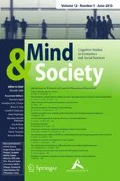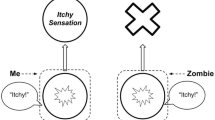Abstract
Dualism can be contrasted with monism, and also with physicalism. It is argued here that what is essential to physicalism is not just its denial of dualism, but the epistemological and ontological authority it gives to physical science. A physicalist view of the mind must be reductive in one or both of the following senses: it must identify mental phenomena with physical phenomena (ontological reduction) or it must give, an explanation of mental phenomena in physical terms (explanatory or conceptual reduction). There is little reason to call a view which is not reductive in either of these senses “physicalism”. If reduction is rejected, then a non-physicalist form of monism is still available, which may be called “emergentism”.
Similar content being viewed by others
References
Carnap, R. (1955)Logical Syntax of Language (Berkeley, University of California Press).
Crane, T. & Mellor, D.H. (1990) There is no question of physicalism,Mind, 99 pp. 185–206.
Crane, T. (2000) The significance of emergence, in B. Loewer (Ed.),Physicalism and its Discontents (Cambridge, Cambridge University Press).
Davidson, D. (1970) Mental events, in L. Foster & J. Swanson (Eds.),Experience and Theory (London, Duckworth).
Hart, W.D. (1988)The Engines of the Soul (Cambridge, Cambridge, University Press).
Jackson, F. (1996). Mental causation,Mind, 105, pp. 377–413.
Kim, J. (1996)Philosophy of Mind (Boulder, Westview).
Lewis, D. (1966) An argument for the identity theory,Journal of Philosophy, 63, pp. 17–25.
Lewis, D. (1980) Review of Putnam, in Ned Block (Ed.)Readings in the Philosophy of Psychology, Volume 1 (London, Methuen).
Poland, J. (1993)Physicalism: the Philosophical Foundations (Oxford, Oxford University Press).
Price, H. (1998) Ramsey, reference and reductionism,Mimeo (School of Philosophy, University of Sydney).
Quine, W.V.O. (1958) On mental entities, inThe Ways of Paradox (Cambridge, Mass, Harvard University Press).
Smith, P. (1992) Modest Reductions and the Unity of Science, in D. Charles & K. Lennon (Eds.)Reduction. Explanation and Realism (Oxford, Oxford University Press).
Author information
Authors and Affiliations
Rights and permissions
About this article
Cite this article
Crane, T. Dualism, monism, physicalism. Mind & Society 1, 73–85 (2000). https://doi.org/10.1007/BF02512314
Received:
Accepted:
Issue Date:
DOI: https://doi.org/10.1007/BF02512314



